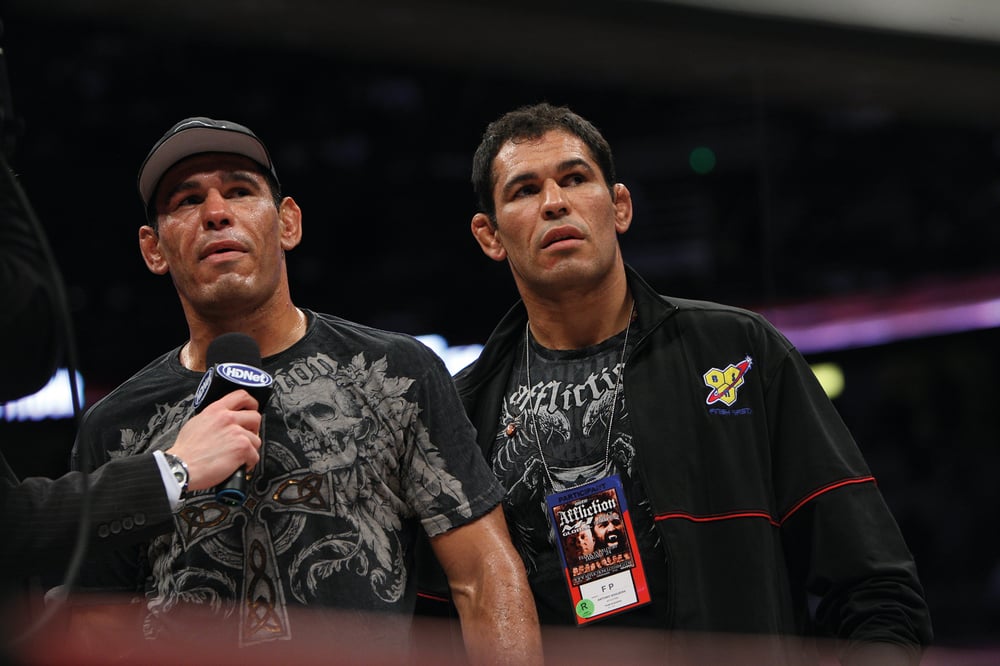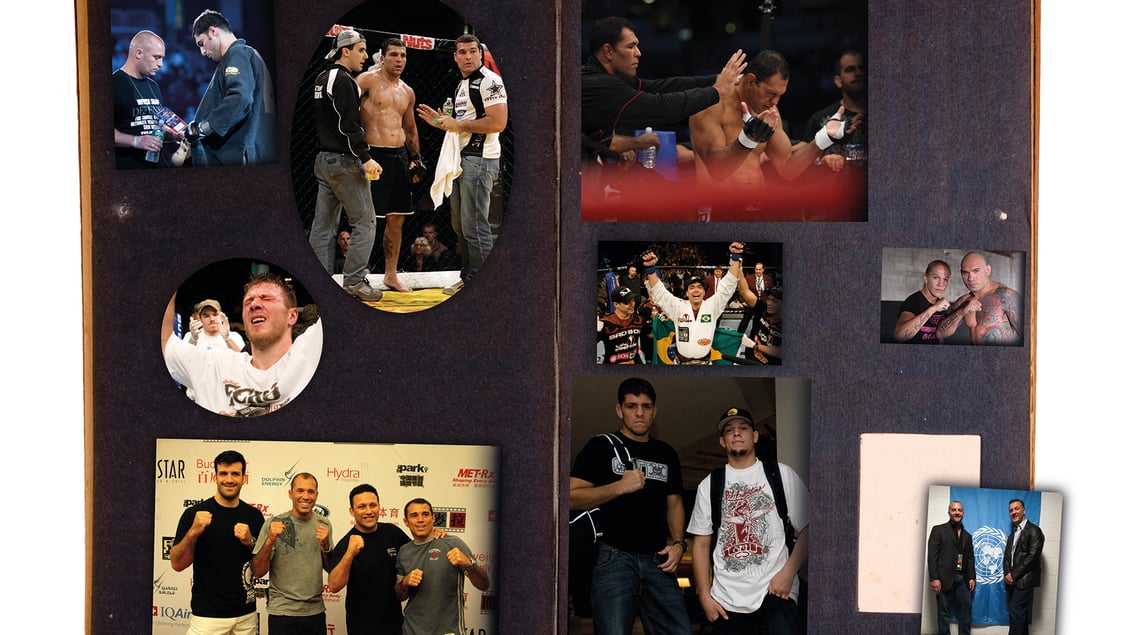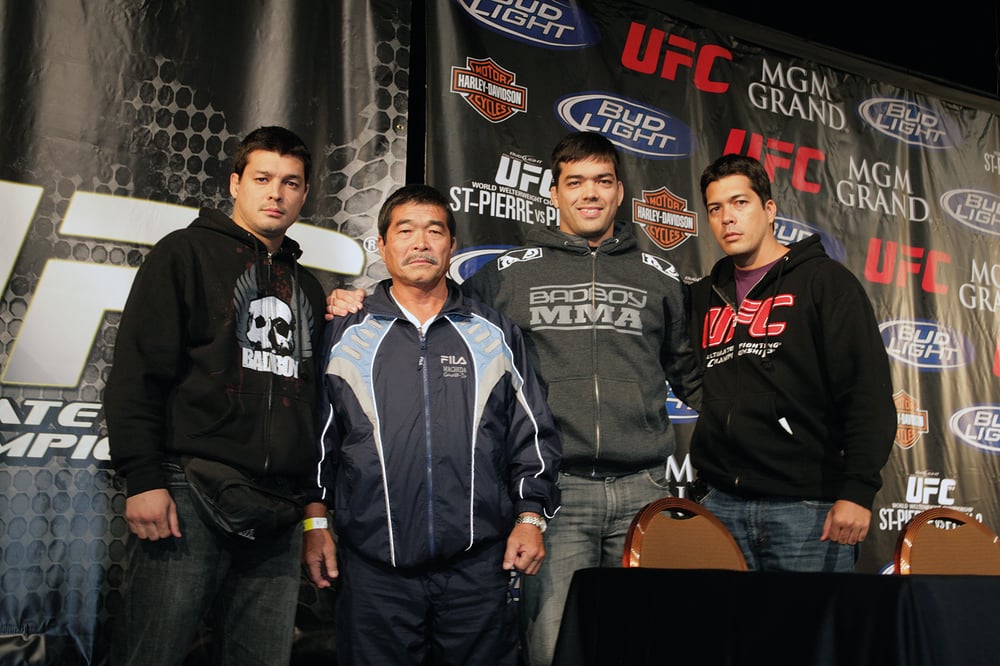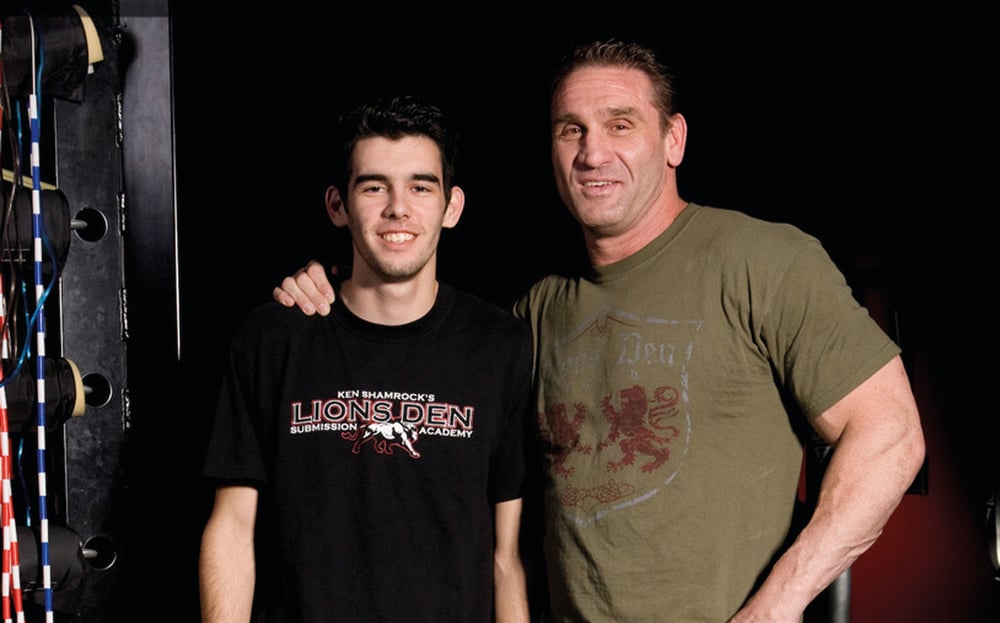
Issue 053
August 2009
Whether you’ve realized it or not mixed martial arts has an astounding number of family ties between its competing participants, rivaling that of any other sport in the world. With the sheer volume of high-profile fighters having competing siblings and family members involved in MMA we decided to find out whether genetics, upbringing, or other influencing factors are responsible and whether blood is truly thicker than water.
Nature or nurture?
Are some families genetically predisposed to fighting? From an evolutionary point of view natural selection would certainly favor those capable of violence and with a competitive nature. Often fighters will comment that they feel ‘driven’ to fight and if it were a case of genetics that would carry over into other family members.
The first family of fighting, that giant Brazilian clan of jiu-jitsu experts known as the Gracies, didn’t just revolutionize the world of martial arts. They laid down the foundations for the entire sport of MMA to grow upon and, when you talk about fighting families, they are certainly the most famous.
The story of how they developed their family art is well documented, but what is so amazing is the level of involvement almost every male member of the clan has had. Helio, one of the founding fathers of jiu-jitsu and the man responsible for popularizing and developing the family art, sired many children. His eldest, Rorian, conceptualized the first Ultimate Fighting Championship event, of which younger brother Royce was the inaugural winner. Royce’s brothers Rickson and Royler were also active competitors on both the jiu-jitsu mat and in the ring, but Royler says there was never any pressure from their father to compete. “The first time I competed, I remember my father came to me and said, ‘If you lose I give you 20 bucks, and if you win I give you ten bucks. I looked at him and said, ‘Why do you give me more money for losing?’ And he said ‘Because nobody likes to lose.’ My first event, I lost, and he tried to make me feel more comfortable and give me money. That’s how he made me feel about fighting my whole life. He never pushed me.”
In a family where every male member was trained in an art that could incapacitate or even kill an opponent, you might expect the occasional argument to break out, especially among notoriously passionate Brazilians, but Royler says that the relationship between the brothers was a strong and happy one. “Everybody rolled all the time,” he says. “We had mats at home, mats at the farm, everywhere. We just really enjoyed it. We always supported each other, and that’s a good mentality.”
The Gracies grew up in an environment of competition with the entire family being involved. Whether this impacted on their passion for the sport or not blurs the line between nature and nurture. The passion that Gracie family members demonstrate for their family name and art (exemplified by Renzo Gracie in the excellent ‘Renzo Gracie: Legacy’ documentary) suggests an almost innate desire to fight and compete.
Whereas the Gracie art developed from the ‘Gracie challenge’ summed up in the phrase ‘come and have a go if you think you’re hard enough’ elsewhere in Brazil another family were cultivating a similar, but different heritage.
Raised in the martial way
UFC light heavyweight Champion Lyoto Machida is the epitome of a modern martial artist. Not since the early days of the UFC - when the Gracies, and Jiu Jitsu, so clearly dominated with a single definable art - has there been such a competitor. Machida’s very unique style is a definite product of his upbringing however.
“I was born into a very traditional martial arts family so I was inevitably going to be involved in it [fighting] somehow,” says Lyoto. His father, Yoshizo Machida, a Shotokan Karate master, raised his sons with his chosen martial art and Lyoto is said to have started his training at the young age of three. Similar to the Gracie family, Yoshizo was passing on family tradition albeit in a more traditional martial arts manner.
Speaking with SI.com earlier this year he commented “My parents brought me up in the Samurai style,” and he continued this with his own sons. Whilst Lyoto is the most successful Machida to date in MMA, his brother Shinzo (one of the world’s best Shotokan Karate stylists) has also dabbled achieving a 1-1 record, and Lyoto always centers his training around his father and brothers.
When raised in an environment with such focus on the martial way and competition it would be hard to deny any supposed biological programming although it would be prudent not to rule it out completely. If Lyoto’s phenomenal success was all Yoshizo’s doing he would likely be facing a plethora of parents begging him to turn their offspring into future UFC champs!
Closer through fighting
Some families have ‘accidentally’ found themselves in fighting, with circumstance leading them to the cage, but how they interact can vary wildly from family to family.
Jim and Dan Miller both signed with the UFC in 2008 having been active on the pro circuit since 2005. With a wrestling background that stretches back to their childhood, they found their talents were well suited to the Octagon, and they’ve managed a combined record of 24-4-0 in the four years they’ve been fighting.
Dan, a 185lb fighter, tells of how it was a combination of boredom and an interest in the growing sport that started them on their path to becoming professional mixed martial artists. “We were both working for my dad doing construction. It was the winter, there was a lot of snow so we weren’t working much. We had been watching the UFC and The Ultimate Fighter for a while, we were bored, figured it looked like a lot of fun and we both started training.”
They grew up in New Jersey, a state known for producing tough blue-collar fighters. Dan is the older brother by two years (and coincidentally, he fights two weight divisions higher than lightweight Jim), but he claims they never fought while growing up. “We’d have little wrestling matches, beat each other up and stuff, but nothing like you see on YouTube,” he laughs. “We never got into fist fights or anything. We weren’t as close as we are now, but we still used to be pretty close. We never fought that much.”
By training together, Dan feels that they’ve actually strengthened their relationship even further. They workout together every day and consider each other their main training partner. No matter what is going on they will always make time to be available to train. “Even if we’re sick, tired or on vacation, we’re there for each other,” he says. “Like I’m training [for a fight] right now and he’s there every day for me.”
Sibling rivalry
If the Millers are the ideal example of how brothers should behave toward one another, then the Lauzons are the complete opposite. Joe, 25, and Dan, four years his junior, are known for their intense and aggressive fighting styles. That’s about all they have in common though, with Joe claiming they argue about everything. “Me and Danny, we’re alike in that we both train and we both fight, but the similarities end there. We disagree on absolutely everything. Pretty much anything he says, I’m gonna disagree with. It’s not that we do it just because, it’s because that’s what we think. We’re just very, very different. We’re not always on the best terms, but we get on for the most part.”
It doesn’t take a family psychologist to work out that their stormy relationship stems from their age difference, compounded by the fact Joe and his friends would often subject Dan to a bit of good-natured torture in their youth. “I started training when I was 16 or 17, so Dan was 12 or 13. It was basically me and a couple of friends, we were learning jiu-jitsu, and we’d be doing it to each other and if we saw my brother we’d do it to him! Four years at that age is a huge difference. When I’m 16 and he’s 12, there was no way he was getting away. He was like our grappling dummy! We’d do all this stuff to him, plus we usually had him outnumbered two or three to one. We weren’t hurting him, he just wasn’t exactly a willing participant. We’d do all this stuff and he’d ask questions and we’d show him, and then he’d do it to his friends, and that got him hooked!”
Like Jim and Dan Miller, Joe and Dan are training partners, but Joe admits that they can get a little heated in the gym, and even have to be broken up sometimes during sparring (“We’ll start talking shit to the other, and then that’s usually when bad things happen”). But much like the Millers, they’ll do whatever necessary to make sure the other is as prepared as they can be for any upcoming fights. “Regardless of whether we’re getting along or we’re not, if he has a fight coming up I’ll do anything,” says Joe. “I’ll let him put a hurting on me, I’ll let him beat me up, I’ll do everything I can to train hard but make sure he doesn’t get hurt – and he’ll do the same for me.”

Joe Lauzon explains that both he and his brother are “a pain in the ass” when cutting weight, and things can easily boil over should one upset the other. “Dan cuts a lot more weight than me but I’m still just as miserable as he is. I remember two fights ago, we forgot the scale at the hotel, it wasn’t far away, it was like maybe a quarter of a mile away. But we go to cut weight and I don’t have my scales, so I ask Dan to go get it. I’m in a bad mood so I’m mouthing off to him, he’s mouthing off to me. He ended up walking all the way there and all the way back to get the scales. He came back and he kicked it at me and then stormed out of the place. If I’m in a bad mood, he’s in a bad mood.”
Play fighting between siblings can be seen among a wide variety of species in the animal kingdom but between humans it usually serves to establish the most important trophy any brother (or sister) can hold over another - bragging rights! Joe and Dan weren’t the only brothers to ‘play’ fight at home. Light heavyweight fighter Jon Jones is one of three brothers, but at 6’4” and 220lb actually describes himself as the “runt of the family”, and the fights between him and his brothers would often get a little out of hand. “I have two brothers who are Syracuse University football players, and they are really intense, big guys,” he says. “My younger brother, who is starting for Syracuse next year, is 6’6” and 250lb, and he’s only 19 years old. Then my older brother is 6’4” but he’s 285, 290lb. It was deadly. It was always me and my older brother, Arthur. We’re 13 months apart, and we would go at it hardcore. My mom had to replace the living room set numerous times, we were always breaking the couches, slamming each other on dining room tables and things. We love each other though, we’re best friends.”
Brothers in arms
Brothers may sometimes fight like cat and dog, but that doesn’t mean you won’t find them stood side-by-side when shit goes down. The Lauzons and the Millers always work the corner for each other, with both Joe and Dan Miller admitting to getting more nervous for their brother’s fights than they do for their own. “You have no control over what happens,” says Dan. “It kills me when I’m in the corner and I can’t do anything about it. There have been times when I’ve almost thrown up as I’m walking out to corner Jimmy!”
“When the fight’s not going well, that’s the worst,” says Joe. “I never get nervous for my fights at all, but when he’s in there, and it doesn’t matter, he can be beating on the guy, I’m so nervous the whole time. I have some influence on my fights, I can help him get ready but when it comes to the fight you’re completely helpless.”
Play together, stay together?
If you’re not born into it there’s a good chance that you could marry into the fighting way. An increasing number of fighters are either marrying or dating, with a common passion and lifestyle bringing them together. Be warned though – relationships between fighters can bring their own unique set of challenges.
Spencer and Emily Fisher met when she wrote an article on him for a college paper. Spencer most recently beat Caol Uno at UFC 99 while Emily returned to the cage this year after a five-year break. The story got her interested and involved with the sport, and as Spencer says, “She started training and the rest is history.” Together for ten years, they have three daughters and a growing business in their new gym. They train in the mornings and are back in the gym again in the evening, with only a few hours off during the day. According to Emily, these hours usually get swallowed up by “catching up on things around the house and stuff,” so making time for each other is a priority. “You really have to make time for your family. It’s really important so you don’t go crazy,” she says, explaining that they try to get away from the fight scene whenever possible.
As much as they try, sometimes the day-to-day annoyances can manifest themselves as very real arguments in the gym. “If there is bad energy in the house it will transfer into the gym as well,” says Spencer. “If one of the kids does something and it doesn’t sit well with us, we take it out on the other one. Everybody prepares for a night of hell at the gym!” he laughs. He admits to “avoiding her at all cost” during sparring, lest it give her a chance to take out some of those frustrations. “She really likes to put it on me, I watch her take it easy on some of the other people, and she kicks the crap out of the guys who fight at 145lb, but that’s nothing compared to what she does to me! She kicks the crap out of me!” “Sometimes we take things a little too personally than we should,” she says. “I always feel better after I’ve hit him a few times!”
The Fishers aren’t the only husband and wife fight team in MMA. There is the famous Brazilian couple, Evangelista and Cris ‘Cyborg’ Santos, Brandon Vera’s wife Kerry is a successful kickboxer, and veteran fighter Jeremy Horn is in a long-term relationship with Jennifer Howe, formerly ranked as one of the top female fighters in the world.
Like father, like son
As MMA is still a relatively young sport, there are very few cases where it is possible (aside from the Gracies and Machidas) to trace a fighting pedigree from father to son, but there are two very notable examples.
Legendary fighter and entertainer Ken Shamrock, known for his feuds with everyone from Royce Gracie to Tito Ortiz, has seven children and two grandchildren. His son Ryan, born in 1988, made his MMA debut in August of 2007 and has two fights to his name. Ryan doesn’t quite cut the same imposing figure as Ken, standing only 5’9“ and fighting at 135lb (compared to his 6’1”, 220lb father).
Another son following in his father’s footsteps is Ryan Couture, son of former UFC heavyweight champion Randy. Ryan, a former high-school wrestler who gave up his job in a bank to train full-time, sports an amateur record of 2-1-0, but also seems to be cut from a vastly different physical cloth than his father – whereas ‘The Natural’ fights at both light heavy and heavyweight, Ryan is a bona fide 155lb fighter.
Ryan and father Randy can be often be found on the mats together during the pro practice sessions at Xtreme Couture in Las Vegas, and the gym is turning into something of a family business, with Randy’s ex-wife Kim one of the founding members, Ryan as gym manager, and Randy’s daughter Aimee working on the front desk and in the shop that sells all the pro gear. “It’s great to have the family around the gym,” says Randy. “I know I can trust them to always look out for me and for the best interest of the company. It also ensures that we get to see each other regularly, which otherwise wouldn’t be easy with my hectic schedule.”
Fighting together
From families who fight because it’s in their blood and is what defines them, to families raised in environments that helped steer them to fighting, to families who grow through the sport - whatever the reasons for so many close family members being involved in MMA one thing that kept coming up was that there are few things stronger than the bond between family members. When you’re alone in the cage, the knowledge that the person holding the white towel understands you better than anyone else can mean the difference between winning and losing. It might not be easy at the time to watch a loved one get hurt during the fight, but the benefits of training and fighting side by side can eclipse those concerns and foster a healthier, stronger bond, even in a relationship as stormy as Joe and Dan Lauzon’s. In a case such as theirs, it seems that if you fight together, you’re tight together.
“You care so much about what they do, 100 times more than you care about yourself,” Joe says. “My fights, I obviously want to win and train really hard for them, but I care way more about his fights than I do my own.” If brothers who disagree about everything will support each other to that degree, then maybe more families should take up MMA.














